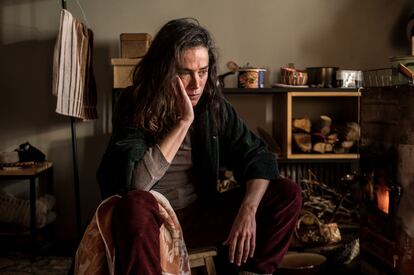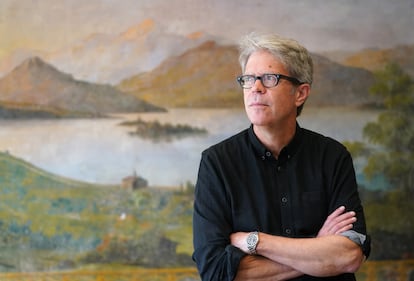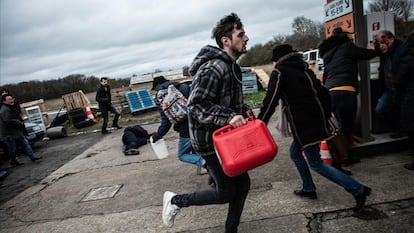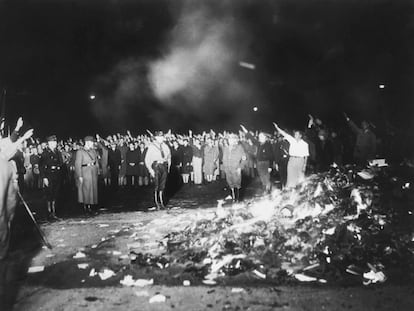‘Ok, doomer’: Why contemporary fiction seems resigned to a climate apocalypse
Persistent calls to action in nonfiction are a stark contrast to the inertia and handwringing found in the literature, TV series and films of today

“What if we stopped pretending?” Ever since Jonathan Franzen wrote those words about climate change in a 2019 New Yorker article, he has often repeated the belief that we can’t prevent an eventual climate collapse. “You can keep on hoping that catastrophe is preventable, and feel ever more frustrated or enraged by the world’s inaction,” wrote Franzen. “Or you can accept that disaster is coming, and begin to rethink what it means to have hope.” In his 2021 novel, Crossroads, Franzen tells the story of an ordinary American family in the 1970s. While his latest novel leaves behind the global overpopulation futility expressed in Freedom (2010), Franzen nevertheless has become the literary face of a nihilistic fatalism that he gladly discusses at every opportunity.
Franzen is not deterred by writers like Rebecca Solnit who say that “climate despair is a luxury” because “those facing flood and fire can’t afford to lose hope.” In a recent Australian radio interview, Franzen ominously said, “We literally are living in end times for civilization as we know it… We are long past the point of averting climate catastrophe.”

Environmentalists accuse Franzen of being another “white millionaire doomer,” a play on the disparaging “Ok, boomer” meme popular among millennials. “Ok, doomer” has gone on to become a meme in its own right, usually directed at the end-times narrative of resigned hopelessness. “The only people who fall into that trap are rich white people who think they won’t be saved until everyone and everything else disappears,” said Brynn O’Brien, director of the Australasian Centre for Corporate Responsibility, a climate research and advocacy organization. O’Brien has harsh words for the likes of Franzen, and rebukes him for “an unscientific, morally careless at best, and politically blind position.” As Mark Fisher wrote in his 2009 book, Capitalist Realism, it’s much easier for some people in this era of savage neoliberalism to envision the end of the world than the end of capitalism.
Novels full of powerless inertia
Is Franzen the biggest climate-crisis defeatist? Don’t count out Sally Rooney and her literary heroines. Despite huge sales and public interest, Rooney determinedly shuns the media spotlight. After three successful novels and several TV adaptations of her work, Rooney has been called “the voice of this generation.” The protagonists of her stories are women wearied by a world in decay who dissociate themselves from reality while striving to feel something. Yet these women bury their guilt for living on a dying planet without doing anything to save it. In her latest novel, Beautiful World, Where are You (2021), the character of Eileen rants about the vulgarity and decadence of investing energy in the trivialities of sex and friendship when human civilization is on the verge of collapse.

The unmoored thirtysomething women in Rooney’s novels aren’t the only ones resigned to the end of the world. In Jenny Offill’s 2020 novel, Weather, college librarian Lizzie leads a humdrum life until she starts working for a successful podcast on climate change and her world is turned upside down. Lizzie fears becoming another one of those doomsday nutcases, yet she memorizes facts like how people can survive three hours in very harsh conditions without shelter, three days without water and three months without hope. Lizzie and her ilk assume eventual defeat and resign themselves to this self-fulfilling prophecy.
Contemporary literary fiction often tills the soil of guilty selfishness, a sudden self-awareness of our fragile existence and the seductive buzz of extinction. We have Ian McEwan’s Solar (2010), which satirizes institutional cowardice in the face of crisis; Margaret Atwood’s MaddAdd trilogy of self-destruction and post-apocalyptic societal collapse; and the depressing 1,200-page monologue of a disillusioned housewife in Ducks, Newburyport (2019) by Lucy Ellmann, who is convinced that people today are the saddest to ever live because they know they messed it all up.
Wallowing in climate grief
Why do the novels that garner so much critical and popular acclaim almost always seem to wallow in the gloom of climate grief? Nearly 20 years ago, naturalist Robert Macfarlane wrote an influential article titled “The burning question” in The Guardian, arguing that writers can play a crucial role in helping us imagine the impact of climate change. Macfarlane bemoans the lack of literature on climate change, and asks “Where are the novels, the plays, the poems, the songs, the libretti, of this massive contemporary anxiety?” Fiction writers have responded by producing a literary overdose of existential angst.
While nonfiction writers like Solnit urge us to roll up our sleeves and take immediate action, fiction writers mostly tell stories about people paralyzed by the impending apocalypse. It’s seen in television series (The Collapse, Apagón) and films like Don’t Look Up, or almost all of Roland Emmerich’s films of the last 20 years. The themes of a world with no future and planetary self-destruction have become pervasive in contemporary fiction.
What about comedy?
Besides a few writers like Irene Solà (When I Sing, Mountains Dance) and Richard Powers, who won the 2019 Pulitzer Prize for The Overstory, not many have ventured to write stories that inspire readers to climate activism. We have Estio, a Spanish-language collection of short stories on climate, and a few novels that explore Extinction Rebellion-type climate justice movements like Venomous Lumpsucker by Ned Beauman.
It seems that fiction writers are disinterested in stories of optimism and transformation. Literary critic Martin Puchner says, “The problem is the emphasis on sudden and catastrophic changes. We are still hooked on plots with flash floods because climate change is too slow for our short attention spans. This is the challenge for climate fiction – make us sit up and notice that slow pace of change.”

Puchner, a professor of English literature at Harvard University and author of numerous books, including Literature for a Changing Planet (Princeton University Press, 2022) and The Written World (Random House, 2017), says that new literary paths need to be explored “not because climate change is funny, but because it [comedy] can be a powerful vehicle for writing about everyday life, habits and imperfections.” He professes admiration for The Overstory and describes by Richard Powers’ climate fiction as being deeply informed by science. Puchner wants to see more fiction that marries scientific knowledge with transformative stories. He says, “We need a new combination of fiction and nonfiction, climate science and imagination,” and plots that transcend hackneyed apocalyptic laments that incite “Ok, doomer” memes.









































